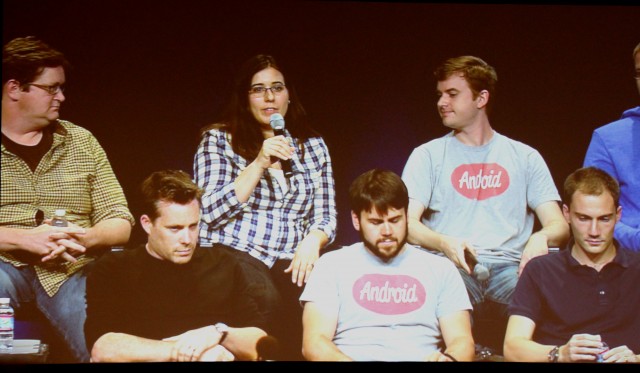
SAN FRANCISCO, CA—Although Google's keynote at the I/O conference this week focused heavily on the APIs and behind-the-scenes development of the Android operating system, it looks like there's a lot more in store. This idea was especially apparent in a panel discussion today involving eleven members of the Android development team. The team sat for a forty-minute question and answer session, and while they dodged most inquiries about forthcoming features for Android, they did offer a bit of insight into what the future of Android might look like, what developers could do to help further the platform, and what they’ve learned from their journey thus far.
The conversation began with a question relating to whether or not the Android team would have done anything differently from the beginning. Senior Android Engineer Dianne Hackborn said the team "should have had more control over applications. A big example is the whole settings provider, where we just let applications go and write to it... it was a simple thing that we shouldn’t have done." Ficus Kirkpatrick, one of the founding members of the Android team and the current lead for the Google Play Store team, added that “you’re never going to get everything right the first time. I don’t really regret any of the mistakes we’ve made. I think getting things out there at the speed we did…was the most important thing.”
The team also briefly touched on fragmentation and how they’re working to combat the issue—it was even referred to as the “F” word. "This is something we think about a lot,” said Dave Burke, engineering director of the Android platform. He explained that many silicon vendors take the open source code, break it apart, and create their own Board Support Packages (BSPs) to make their hardware compatible with the software. To streamline the process, the Android team made the code for the platform more layered, so if a vendor needs to make changes, they have a clean abstraction layer to do so without affecting the entire operating system.
As for why there are legions of users on older versions of Android, Burke answered that there is a predominance of Gingerbread in emerging markets because it runs on lower memory. The lagging effects that some users may experience has more to do with each of the individual applications than the system itself, and those applications are sometimes optimized to work only with newer hardware. "We’re looking at ways to make Android more efficient for the entry-level smartphones to help improve that situation,” he added.
Matias Duarte, Google's director of the Android user experience, reaffirmed that the Android team is “working in lots of different ways and relationships... our OEM partners are really important to us.” He added that fragmentation is a very complex problem and that the team is attempting to fix the issue by promoting the stock version of the Samsung Galaxy S 4, for example, which more users might recognize over the Nexus 4. Although it's not a Nexus device, it is distributed and managed by a third-party, and it will receive timely software updates just as the developer versions of the handsets will.
The team of engineers also acknowledged the complexity of the latest hardware, but they went on to discuss how device technology is actually helping innovation within the Android platform. “We do a lot of iteration... so that we try to build a system that works really well on a broad range of hardware,” said Burke. “I feel like Android is a baby; I feel like there is so much more we can do.” With the range of hardware innovations coming from OEMs—more powerful GPUs, the inclusion of Infrared transceivers, and better camera lenses—Burke said that there is going to be a lot of innovation across the board for many years to come.
The team took some time to talk about Project Butter, the initiative that was meant to make the Android operating system more responsive and faster for all users. Project Butter was announced at last year’s I/O to help address Android users’ complaints related to lag and poor performance. The word “butter” refers to making the operating system run more smoothly. Burke explained that the team had “made a lot of progress with Jelly Bean, but… there is a lot more we can do. We’re not at the level that we could be.” He says that it can be difficult to try to make the same experience happen across devices when the team is working on hardware like the Nexus 4 because it already features a high-performance GPU. Burke said the team was "spoiled" by the GPU in the Nexus 4, but he noted that the team is working with other hardware to ensure that it runs optimally. “That 16.666 millisecond window is really critical,” added Burke. “It’s critical that we make sure our applications are efficient and adhering to that.”
Romain Guy, Android’s senior software engineer, also weighed in. “It’s not something we can ever be done with,” he said. “Every time we write new features or applications… we have to make sure that the new code doesn’t impact performance.”
The sessions helped reiterate the fact that there is still much in store for the future of Android, and regardless of the lack of massive software announcements at this year’s developer’s conference, development is still on the fast track. In an earlier part of the chat, Kirkpatrick reflected on Google’s philosophy for its future in mobile. "The industry is very competitive, and it’s changing all the time,” he said. “Something we try to do in Android is we try to be very agile... we adjust our plans to that.” With the keynote and the sessions that have been offered at I/O, it is very clear that Google will push forward with that in mind.
reader comments
101